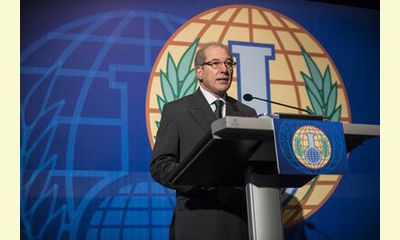|
|
Statement by the OPCW Director-General on the 2013 Nobel Prize for Peace
un article par Organisation for the Prohibition of Chemical Weapons
The decision by the Nobel Committee to bestow this
year’s Peace Prize on the OPCW is a great honour for
our Organisation.

OPCW Director-General Ahmet Üzümcü addresses the media on 11 October 2013 on the occasion of the organisation's winning of the Nobel Peace Prize.
click on photo to enlarge
We are a small organisation which for over 16 years,
and away from the glare of international publicity,
has shouldered an onerous but noble task – to act as
the guardian of the global ban on chemical weapons
that took effect in 1997.
That year, a hundred-year effort was crowned with
success as the Chemical Weapons Convention entered
into force.
Our organization was tasked to verify the
elimination of chemical weapons from the world and
to encourage all nations to adhere to this hard-
earned norm.
We have since then worked with quiet determination
to rid the world of these heinous weapons – weapons
which have been used to horrific effect throughout
the twentieth century, and, sadly, in our own time
too.
Events in Syria have been a tragic reminder that
there remains much work yet to be done. Our hearts
go out to the Syrian people who were recently
victims of the horror of chemical weapons.
Today we are engaged in work which is meant to
ensure that this atrocity is not repeated.
Never in the history of our organisation have we
been called on to verify a destruction program
within such short timeframes – and in an ongoing
conflict.
We are conscious of the enormous trust that the
international community has bestowed on us.
Working to realize the vision of a world free of
chemical weapons, we rely on the expertise,
professionalism and dedication of our staff –
qualities that have been forged through a solid
record of achievement.
This would clearly not be possible without the
steadfast support and commitment of our States
Parties.
The recognition that the Peace Prize brings will
spur us to untiring effort, even stronger
commitment and greater dedication.
I truly hope that this award, and the OPCW’s
ongoing mission together with the United Nations
in Syria, will help broader efforts to achieve
peace in that country and end the suffering of its
people.
I take this opportunity to commend all those who
have contributed to making the ban on chemical
weapons an enduring and universal norm.
I look forward to accepting this award in humility
and in recognition of the professionalism of our
staff, both past and present, and the strong
support we have received from our States Parties.
|








|
DISCUSSION
Question(s) liée(s) à cet article:
Can chemical weapons be abolished,
* * * * *
Commentaire le plus récent:
This discussion question applies to the following articles:
US Strategy for Ridding Syria of Chemical Arms
Parliaments Demand Zero Tolerance on Chemical Weapons
Statement by the OPCW Director-General on the 2013 Nobel Prize for Peace
Good news: Destruction of Syria's Chemical Weapons

|
|









